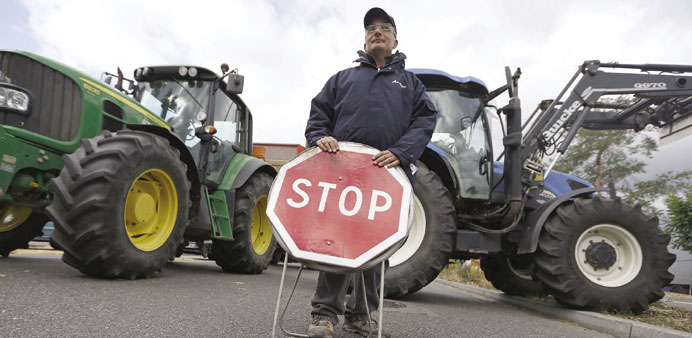A French farmer holds a stop road sign in front of tractors blocking trucks that transport food products from foreign countries at the French German border in Strasbourg.
AFP/Strasbourg
French farmers furious over falling food prices stopped as many as 400 lorries bringing produce from Germany for several hours yesterday, as a similar protest took place near the Spanish frontier.
The farmers later lifted the blockade near the German border after winning a meeting with France’s agriculture minister but swore to remain on alert “as we wait for results”.
“From now until the end of August, things will be happening,” warned Franck Sander, local head of the FNSEA farming union, hinting that protests could be directed at large retail outlets.
The farmers had set up checkpoints on six roads between Germany and France late on Sunday night with around 1,000 people and tractors.
Sander said that the aim was to turn back lorries he said were “transporting products that are distorting competition for us”.
“For example, we made a lorry carrying Babybel (cheese) turn back. Consumers think this is French but the cheese comes from Slovakia,” he said.
Protesters also turned back several lorries laden with fruit and vegetables on their way from Germany.
Other farmers have carried out similar actions stopping produce getting into France from Spain.
Around 100 farmers ransacked dozens of trucks from Spain on a highway in the southwestern Haute-Garonne region, threatening to unload any meat or fruit bound for the French market.
They used around 10 tractors to block the motorway not far from the Spanish border, causing traffic jams that stretched up to 4km, Guillaume Darrouy, secretary general of the Young Farmers of Haute-Garonne, told AFP.
The action came after a week that saw farmers block cities, roads and tourist sites across France in protest at falling food prices, which they blame on foreign competition, as well as supermarkets and distributors.
Farmers have dumped manure in cities, blocked access roads and motorways and hindered tourists from reaching Mont St-Michel in northern France, one of the country’s most visited sites.
Wary of France’s powerful agricultural lobby, the government on Wednesday unveiled an emergency package worth €600mn ($660mn) in tax relief and loan guarantees, but the aid has done little to stop the unrest.
“The measures announced by the government ... none of them deal with the distortion of competition” with farmers from other countries, said Sander, adding that French farmers face higher labour costs and quality standards.
A combination of factors, including changing dietary habits, slowing Chinese demand and a Russian embargo on Western products over Ukraine, has pushed down prices for staples like beef, pork and milk.
Paris has estimated that around 10% of farms in France – approximately 22,000 operations – are on the brink of bankruptcy with a combined debt of €1.0bn.
Speaking early yesterday morning, President Francois Hollande threw his weight behind the farmers, saying: “They should know that, protests or no protests, we are by their side.”
But the protests have already sparked anger in neighbouring Germany.
An association representing the German milk industry (MIV) said that it had sent a letter to the European Union protesting over the blockades and special measures announced by French authorities.
The head of the MIV association, Eckard Heuser, said that certain proposals made on Friday by French Agriculture Minister Stephane Le Foll were “unacceptable” and a “de facto boycott of German goods”.
Le Foll had announced that milk prices would be set at a minimum of €0.34 ($0.38) per litre to “favour French production”.
Heuser said: “While we understand farmers’ anger over too-low producer prices, measures that hinder competition cannot be the answer. It’s up to the European Commission to see if they will open an investigation.”

